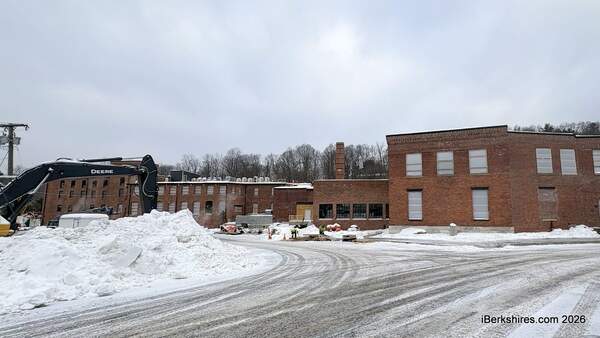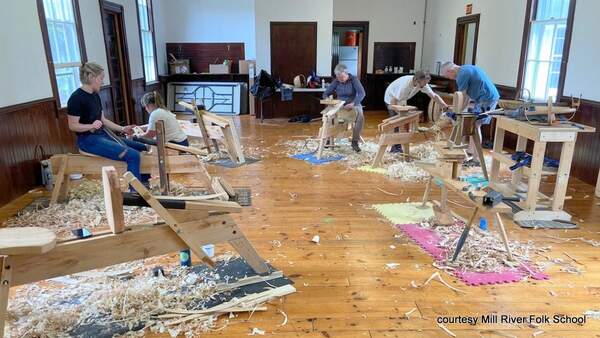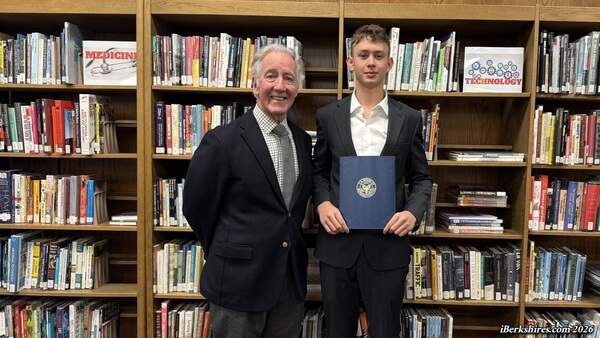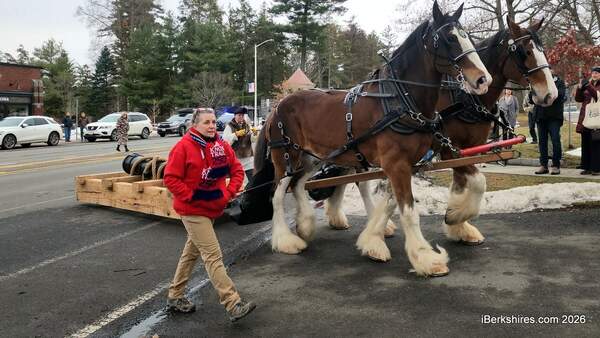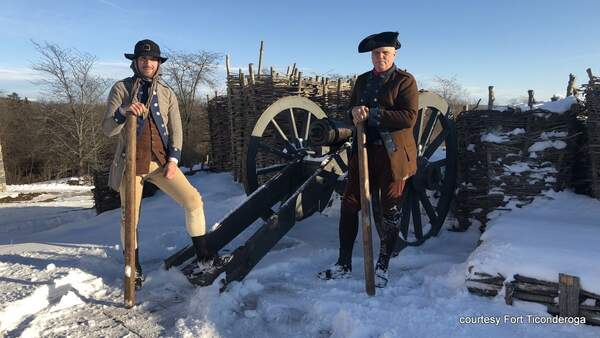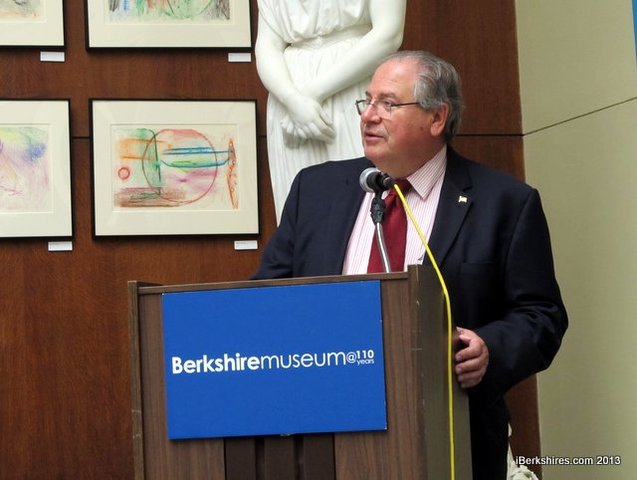
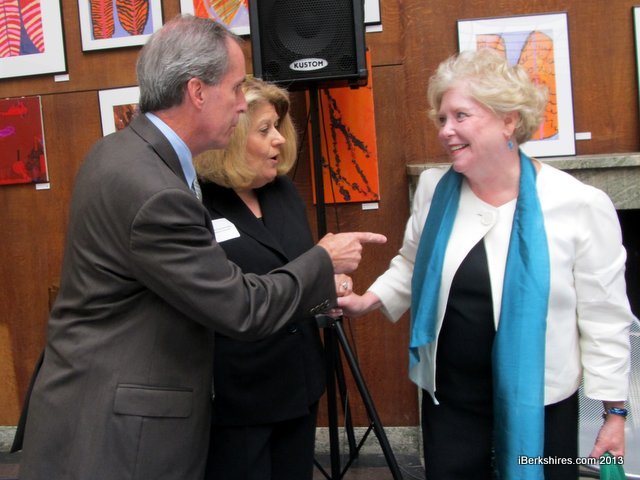
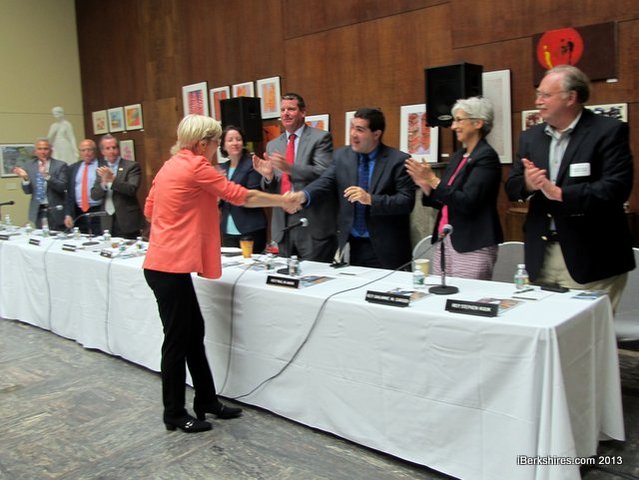
Lawmakers Hear of Importance of Berkshire Tourism
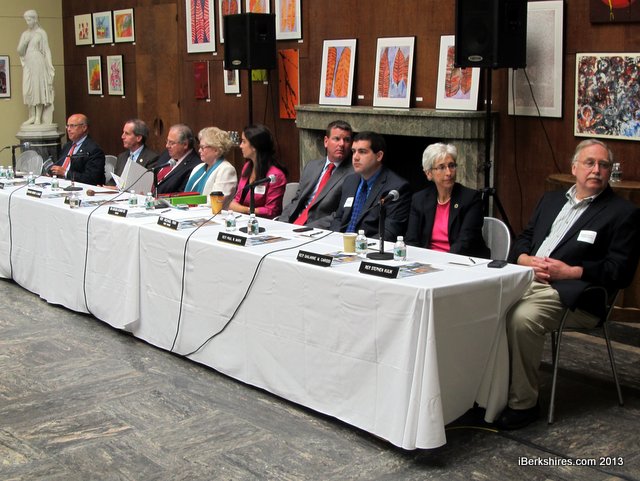 The Joint Committee on Tourism, Arts and Cultural Development held a hearing Monday morning at the Berkshire Museum that attracted leaders of almost all of the county's tourist attractions. Below, co-Chairwoman Rep. Cory Atkins addresses the audience. The Joint Committee on Tourism, Arts and Cultural Development held a hearing Monday morning at the Berkshire Museum that attracted leaders of almost all of the county's tourist attractions. Below, co-Chairwoman Rep. Cory Atkins addresses the audience. |
||
|
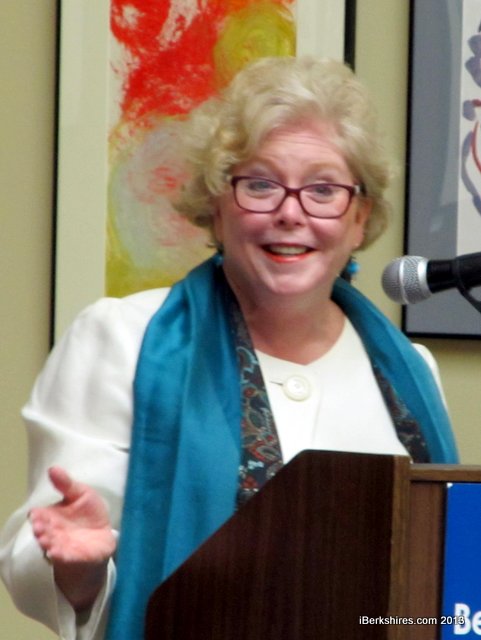 |
|
PITTSFIELD, Mass. — Every 747 that lands at Logan International Airport puts 16 Massachusetts residents to work.
Tourism and culture pump $17 billion into the economy yearly and employs more than 125,000, some 3,500 in the Berkshires alone.
The state needs to do all it can to increase the number of people visiting the state by air and otherwise, said Betsy Wall, executive director for the state Office of Travel and Tourism, at the Berkshire Museum on Monday morning.
The public hearing held by the Joint Committee on Tourism, Arts, and Cultural Development brought cultural, business and political leaders together to plead for additional state support in tourism.
Lawmakers say they understand the importance of the arts in the economy and community, with Committee co-Chairwoman Rep. Cory Atkins, D-Concord, noting that more than 100 representatives sponsored her amendment to add $1.6 million the Massachusetts Cultural Council's budget this year.
Speaker of the House Robert DeLeo said tourism accounts for $60.9 million in revenue for the state budget and creates 125,000 jobs.
"Tourism and arts are an important part of our state's identity," DeLeo said, adding that tourism is the third largest industry in the commonwealth
According to Wall, the Berkshires is currently "outpacing" the entire state while the state is "outpacing" the rest of the country when it comes to tourism dollars. But continuing to capture those dollars could be threatened by the state of New York, because New York has increased its spending on marketing and tourism from $19 million to $60 million.
"We have to fight. We have compete for this money," Wall said. "We have a very, very competitive market."
The market isn't confined to the region — it's the entire world. Wall said Massachusetts has recently opened new markets with advertising and is attracting tourist from Latin America, Asia and the Middle East — to add to such standbys as Europe. Additionally, there is a "robust" domestic marketing program bringing people to the state and New England.
Lauri Klefos, of the Berkshire Visitors Bureau, said she was able to leverage $310,000 in state dollars to get $780,000 in matches from local organizations. With that, the bureau was able to create a year-round marketing plan that reaches 400 million people. That builds on the state's campaign that is reaching those international markets the bureau doesn't have tho funds to reach.
"This investment you made in the Berkshires is really making a difference," Klefos said, adding that in the last year, the county has seen a 6 percent increase in visitor spending.
The attractions where the visitors drop the dollars in the Berkshires say they depend on state funds to help market and operate. According to Tristan Wilson, managing director of Barrington Stage Company, income from tourism accounts for only half of the operating expenses.
"We rely on donations to bridge that gap," he said, donations that rarely come out-of-town visitors, which make up two-thirds of the theater's audience. So the theater company reaches out to national organizations, corporations and the state to find the extra support. "We need the support of the state."
Federal funding remains uncertain with a proposal in the U.S. House that would cut funding for the National Endowment for the Arts in half. U.S. Sen. Elizabeth Warren, who testified, said she believes arts is "a measure of who we are" but funding for the arts is being held up by Republicans.
She encouraged everyone to spread the word of why arts and cultural organizations are important in hopes of getting the message to other states. Additionally, she called for spending money to improve the transportation infrastructure to provide more access.
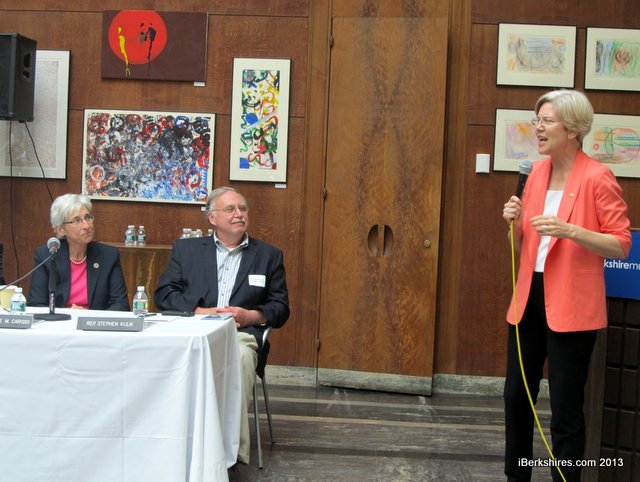 U.S. Sen. Elizabeth Warren testified in support of the arts. U.S. Sen. Elizabeth Warren testified in support of the arts. |
"We've got world-class museums, world-class music, world-class dance. We've got it. We just need to support it and create access to it so there is transportation to get out here. That's a way to bring a stronger economy for this region," Warren said, after her testimony. "It is not just good for this region. It is good for our country. It is the right direction."
Nonetheless, Warren said she is proud of Massachusetts because "we get it" and want to put money into the arts. Warren said she testified to add her voice to that of the local areas in support of humanities.
"It is a great statement here in Massachusetts about how we understand the importance of investing in the arts and we understand what it will mean for this region. It would be great for the Berkshires but we've got to do it," Warren said.
Veronica Bosley, director of tourism for the city of North Adams, said tourism has become a cornerstone of the former mill city's economy and funding for regional tourism councils is imperative to attracting visitors. Bosley said 200,000 people visit North Adams every year and, in the last three years, 10 businesses were able to open because of increased tourism dollars.
Additionally, Jonathan Secor, of the Massachusetts College of Liberal Arts, said partnerships of cultural institutions are keeping a younger demographic from leaving the city.
But arts is not just a way to further the economy. Caroline Burns, president of Berkshire Children and Families, said arts education plays a major role in the development of the youth and helps them grow to become more educated adults.
"Intensive study of the arts is every bit as important as academics," Burns said.
Because of that, Burns said her organization recently began a music program for local schools, helping to fill in gaps from school budget cuts in the arts.
While the state has increased funding of cultural organizations, there is a lot of untapped potential, many who testified said.
Anita Walker, executive director of the Massachusetts Cultural Council, said the financial impacts that are being made with funding from her agency comes from a lot of hard work from the receiving cultural institutions. This year, the organization will be able to increase its impact in the arts by some 15 percent for grant awardees because of the budget increase from the state.
And every one of those dollars will be stretched to get the most of them, she said.
"I am mystified at how these organizations and individuals continue to provide high-quality, world-class enrichment," Walker said, with the funding they have to work with.
Tags: cultural economy, listening tour, MCC, public hearing, state officials, tourism,

